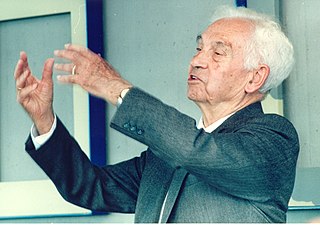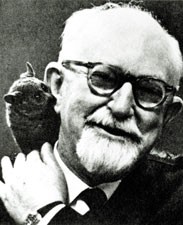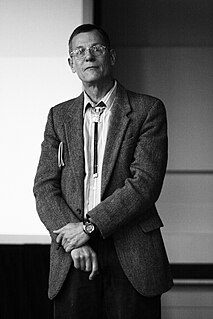Related Research Articles

Ernst Walter Mayr was one of the 20th century's leading evolutionary biologists. He was also a renowned taxonomist, tropical explorer, ornithologist, philosopher of biology, and historian of science. His work contributed to the conceptual revolution that led to the modern evolutionary synthesis of Mendelian genetics, systematics, and Darwinian evolution, and to the development of the biological species concept.

The modern synthesis was the early 20th-century synthesis reconciling Charles Darwin's theory of evolution and Gregor Mendel's ideas on heredity in a joint mathematical framework. Julian Huxley coined the term in his 1942 book, Evolution: The Modern Synthesis.
Lamarckism, also known as Lamarckian inheritance or neo-Lamarckism, is the notion that an organism can pass on to its offspring physical characteristics that the parent organism acquired through use or disuse during its lifetime. It is also called the inheritance of acquired characteristics or more recently soft inheritance. The idea is named after the French zoologist Jean-Baptiste Lamarck (1744–1829), who incorporated the classical era theory of soft inheritance into his theory of evolution as a supplement to his concept of orthogenesis, a drive towards complexity.

Evolutionary biology is the subfield of biology that studies the evolutionary processes that produced the diversity of life on Earth. Simply, it is also defined as the study of the history of life forms on Earth. Evolution is based on the theory that all species are related and they gradually change over time. In a population, the genetic variations affect the physical characteristics i.e. phenotypes of an organism. These changes in the phenotypes will be an advantage to some organisms, which will then be passed onto their offspring. Peppered Moth and Flightless birds are some examples of evolution in species over many generations. In the 1930s, the discipline of evolutionary biology emerged through what Julian Huxley called the modern synthesis of understanding, from previously unrelated fields of biological research, such as genetics and ecology, systematics, and paleontology. A person who studies Evolutionary biology is called an Evolutionary biologist. The importance of studying Evolutionary biology is mainly to understand the principles behind the origin and extinction of species.

George Gaylord Simpson was an American paleontologist. Simpson was perhaps the most influential paleontologist of the twentieth century, and a major participant in the modern synthesis, contributing Tempo and Mode in Evolution (1944), The Meaning of Evolution (1949) and The Major Features of Evolution (1953). He was an expert on extinct mammals and their intercontinental migrations. He anticipated such concepts as punctuated equilibrium and dispelled the myth that the evolution of the horse was a linear process culminating in the modern Equus caballus. He coined the word hypodigm in 1940, and published extensively on the taxonomy of fossil and extant mammals. Simpson was influentially, and incorrectly, opposed to Alfred Wegener's theory of continental drift.

In evolutionary biology, the Baldwin effect, a phenotype-first theory of evolution, describes the effect of learned behaviour on evolution. James Mark Baldwin and others suggested during the eclipse of Darwinism in the late 19th century that an organism's ability to learn new behaviours will affect its reproductive success and will therefore have an effect on the genetic makeup of its species through natural selection. Though this process appears similar to Lamarckism, that view proposes that living things inherited their parents' acquired characteristics. The Baldwin effect has been independently proposed several times, and today it is generally recognized as part of the modern synthesis.

Orthogenesis, also known as orthogenetic evolution, progressive evolution, evolutionary progress, or progressionism, is an obsolete biological hypothesis that organisms have an innate tendency to evolve in a definite direction towards some goal (teleology) due to some internal mechanism or "driving force". According to the theory, the largest-scale trends in evolution have an absolute goal such as increasing biological complexity. Prominent historical figures who have championed some form of evolutionary progress include Jean-Baptiste Lamarck, Pierre Teilhard de Chardin, and Henri Bergson.

Genetics and the Origin of Species is a 1937 book by the Ukrainian-American evolutionary biologist Theodosius Dobzhansky. It is regarded as one of the most important works of the modern synthesis, and was one of the earliest. The book popularized the work of population genetics to other biologists, and influenced their appreciation for the genetic basis of evolution. In his book, Dobzhansky applied the theoretical work of Sewall Wright (1889–1988) to the study of natural populations, allowing him to address evolutionary problems in a novel way during his time. Dobzhansky implements theories of mutation, natural selection, and speciation throughout his book to explain habits of populations and the resulting effects on their genetic behavior. The book explains evolution in depth as a process over time that accounts for the diversity of all life on Earth. The study of evolution was present, but greatly neglected at the time. Dobzhansky illustrates that evolution regarding the origin and nature of species during this time in history was deemed mysterious, but had expanding potential for progress to be made in its field.

Sociobiology: The New Synthesis is a book by the biologist E. O. Wilson. It helped start the sociobiology debate, one of the great scientific controversies in biology of the 20th century and part of the wider debate about evolutionary psychology and the modern synthesis of evolutionary biology. Wilson popularized the term "sociobiology" as an attempt to explain the evolutionary mechanics behind social behaviour such as altruism, aggression, and the nurturing of the young. It formed a position within the long-running nature versus nurture debate. The fundamental principle guiding sociobiology is that an organism's evolutionary success is measured by the extent to which its genes are represented in the next generation.
Michael Ruse is a British-born Canadian philosopher of science who specializes in the philosophy of biology and works on the relationship between science and religion, the creation–evolution controversy, and the demarcation problem within science. Ruse currently teaches at Florida State University.
Teleonomy is the quality of apparent purposefulness and of goal-directedness of structures and functions in living organisms brought about by natural processes like natural selection. The term derives from the Greek "τελεονομία", compound of two Greek words, τέλος, from τελε-, and νόμος nomos ("law"). Teleonomy is sometimes contrasted with teleology, where the latter is understood as a purposeful goal-directedness brought about through human or divine intention. Teleonomy is thought to derive from evolutionary history, adaptation for reproductive success, and/or the operation of a program. Teleonomy is related to programmatic or computational aspects of purpose.

William Ball Provine was an American historian of science and of evolutionary biology and population genetics. He was the Andrew H. and James S. Tisch Distinguished University Professor at Cornell University and was a professor in the Departments of History, Science and Technology Studies, and Ecology and Evolutionary Biology.
Tempo and Mode in Evolution (1944) was George Gaylord Simpson's seminal contribution to the evolutionary synthesis, which integrated the facts of paleontology with those of genetics and natural selection.
Adaptationism, also known as functionalism, is the Darwinian view that many physical and psychological traits of organisms are evolved adaptations. Pan-adaptationism is the strong form of this, deriving from the early 20th century modern synthesis, that all traits are adaptations, a view now shared by few biologists. Adaptationists perform research to try to distinguish adaptations from byproducts or random variation. George Williams' Adaptation and Natural Selection (1966) was highly influential in its development, defining some of the heuristics used to identify adaptations.

Evolutionary ethics is a field of inquiry that explores how evolutionary theory might bear on our understanding of ethics or morality. The range of issues investigated by evolutionary ethics is quite broad. Supporters of evolutionary ethics have claimed that it has important implications in the fields of descriptive ethics, normative ethics, and metaethics.
The Society for the Study of Evolution is a professional organization of evolutionary biologists. It was formed in the United States in 1946 to promote evolution and the integration of various fields of science concerned with evolution and to organize the publication of a scientific journal to report on new research on evolution across a variety of fields.

Jane Maienschein is an American professor and director of the Center for Biology and Society at Arizona State University.

The extended evolutionary synthesis consists of a set of theoretical concepts argued to be more comprehensive than the earlier modern synthesis of evolutionary biology that took place between 1918 and 1942. The extended evolutionary synthesis was called for in the 1950s by C. H. Waddington, argued for on the basis of punctuated equilibrium by Stephen Jay Gould and Niles Eldredge in the 1980s, and was reconceptualized in 2007 by Massimo Pigliucci and Gerd B. Müller.

Teleology in biology is the use of the language of goal-directedness in accounts of evolutionary adaptation, which some biologists and philosophers of science find problematic. The term teleonomy has also been proposed. Before Darwin, organisms were seen as existing because God had designed and created them; their features such as eyes were taken by natural theology to have been made to enable them to carry out their functions, such as seeing. Evolutionary biologists often use similar teleological formulations that invoke purpose, but these imply natural selection rather than actual goals, whether conscious or not. Dissenting biologists and religious thinkers held that evolution itself was somehow goal-directed (orthogenesis), and in vitalist versions, driven by a purposeful life force. Since such views are now discredited, with evolution working by natural selection acting on inherited variation, the use of teleology in biology has attracted criticism, and attempts have been made to teach students to avoid teleological language.

Monad to Man: the concept of progress in evolutionary biology is a 1996 book about the longstanding idea that evolution is progressive by the philosopher of biology Michael Ruse. It analyses the connection between ideas of progress in culture generally and its application in evolutionary biology.
References
- ↑ Cain's web page
- ↑ BSHS Monographs Webpage Archived 29 January 2010 at the Wayback Machine
- ↑ Cain, Joe. 2009. "Rethinking the Synthesis Period in Evolutionary Studies". Journal of the History of Biology42: 621-648.
- ↑ Biographical essays appear in Michael Ruse and Joseph Travis (eds.). 2009. Evolution: The First Three Billion Years (Cambridge: Harvard University Press). ISBN 978-0-674-03175-3.
- ↑ Cain, Joe. 2009. "Ritual Patricide: Why Stephen Jay Gould Assassinated George Gaylord Simpson", in David Sepkoski and Michael Ruse (eds.), The Paleobiological Revolution: Essays on the Growth of Modern Paleontology (Chicago: University of Chicago Press), pp. 346-363.
- ↑ "STS wins award for engagement 25 January 2012" Archived 16 August 2012 at the Wayback Machine . Accessed 19 February 2010
- ↑ "Joe Cain Wins the 2007 Joseph H. Hazen Education Prize from the History of Science Society", British Society for the History of Science. Accessed 7 May 2015
- ↑ 2007 "Competition Winner Announced", British Society for the History of Science. Accessed 7 May 2015.
- ↑ ISHPSSB Newsletter Archived 16 July 2011 at the Wayback Machine , vol. 17 (2006), no. 2, International Society for the History, Philosophy, and Social Studies of Biology. Accessed 19 February 2010